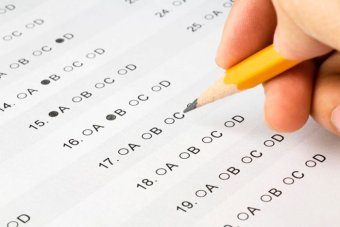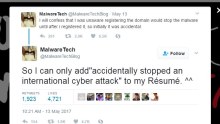Will the new NAPLAN reforms push kids out of school?
Posted
A growing number of educators, principals and parents are calling on the NSW government to scrap new NAPLAN reforms, arguing they will increase the number of students dropping out of high school.
Thousands of year nine students in NSW this week completed a three-day round of NAPLAN tests, but as many as two-thirds — those who fail to achieve the high level of Band 8 or above — will have to re-sit tests before they can become eligible for the award of an HSC certificate in 2020.
The new requirement connecting year nine students' performance in NAPLAN to the HSC has largely flown under the radar since it was announced by then-NSW education minister Adrian Piccoli in July last year.
In a press release on HSC "modernisation", Mr Piccoli said the aim of the measure was to boost standards by picking up stragglers and lifting their literacy and numeracy achievements.
But principals and parents say it is exacerbating students' already unhealthy levels of NAPLAN stress, while experts argue it will increase school drop-out rates among students who see no point in staying in school and who believe they may never get an HSC credential.
What are the NAPLAN changes?
When it was introduced in 2008, NAPLAN was touted as an optional, diagnostic test which would provide educators with a "snapshot" of where each child was at.
But critics say the reforms, which came into effect this year, are now being used to divide the year nine cohort into "pass" and "fail".
While all students will still be allowed to sit the HSC, those who fail to meet the qualifying Band 8 in NAPLAN (a high level, in 2016 gained by only about a third of the cohort) or to pass online tests (to be offered twice a year in years 10 and 11, and for five years after NAPLAN) will have to be content with a lesser document, the Record of School Achievement (ROSA).
 Photo:
High stakes testing like NAPLAN exacerbates student stress and anxiety, says Stephen Grieve. (ABC News: Nicole Chettle)
Photo:
High stakes testing like NAPLAN exacerbates student stress and anxiety, says Stephen Grieve. (ABC News: Nicole Chettle)
The Executive Director of the NSW Parents Council, which represents parents in about 70 independent schools, Stephen Grieve, says the new dispensation is causing an "avalanche" of depression and stress for 14- and 15-year-olds who should not yet be concerned with the HSC.
While he has no objection to external testing, he says the new standard is political posturing, being used by politicians to claim they are "doing something" about poor literacy levels.
But the changes have no educational underpinning that he can see.
"In the student wellbeing domain, NAPLAN is already a negative, and anything that elevates its status is a real negative," Mr Grieve told ABC News.
"They are the most tested children in history, so let's give them a double whammy. This high stakes testing makes the problems worse."
Parent feedback this week, he added, "has been that year nine students are more stressed than ever before."
NAPLAN reforms will make it harder to keep kids in school
Kogarah High School principal, Julie Ross, who said she was expressing her personal view as a mother and educator only, and did not represent the education department, said the linking of NAPLAN results to the HSC credential would make it very hard to retain children in school.
Those who felt they had no chance of getting the credential were becoming disillusioned, she said.
 Photo:
There should be strong objections across the community to having further testing imposed on kids, says Paul Teys. (612 ABC Brisbane: Jessica Hinchliffe)
Photo:
There should be strong objections across the community to having further testing imposed on kids, says Paul Teys. (612 ABC Brisbane: Jessica Hinchliffe)
"[Teachers] don't need NAPLAN, Band 8s and standardised testing to tell us how our students learn, how to differentiate for their learning styles," said Ms Ross, who this week chaired a panel on the new requirements at Sydney University.
Making even more "nonsense" of the reforms, she said, was the fact that the online tests, which will be offered down the track, would be set at level three of the Australian Core Skills Framework — much lower than the Band 8 NAPLAN.
Another panel speaker, Sydney University Professor of Teacher Education, Robyn Ewing, said research by the Whitlam Institute at Western Sydney University had shown children at all ages were anxious about NAPLAN, and parents were so anxious that NAPLAN practice test booklets were best-sellers in bookshops and newsagents.
However, she said NAPLAN measured only "very small, quite narrow" aspects of the curriculum.
Furthermore, Professor Ewing said global research had shown that high stakes testing regimes such as NAPLAN increased inequity for Indigenous students, those whose primary language was not English, and those from low socio-economic backgrounds who did not perform well in tests like these.
'I feel like I'm being punished'
And then there are the children with learning issues or just simply the "late bloomers".
One mother who spoke to ABC News, Julie Hermansen from the NSW north coast, said her dyslexic year nine daughter Isley was disheartened and may "disengage" from school.
"To tell her at age 14 that she's not going to make this band, and will get no HSC, is outright discrimination," Ms Hermansen said.
 Photo:
The new NAPLAN reforms set students up for failure, says Sydney mother Martine Beaumont. (Flickr: Alberto G)
Photo:
The new NAPLAN reforms set students up for failure, says Sydney mother Martine Beaumont. (Flickr: Alberto G)
It is also "moving the goal-post", she added, and a disincentive for year nine students who have soldiered through toward the end of school and were planning to go to university or TAFE.
"Our big issue here is mental health," Ms Hermansen said. "My daughter has some anxiety, and a number of kids are so stressed by the whole idea. It's saying to kids they are not good enough in some way, don't even bother trying the HSC."
Despite the fact that her mother had withdrawn her from the NAPLAN tests, Isley Hermansen said she was worried that she might not get an HSC.
"Why are they doing this? I feel like I'm being punished for something I can't help," she said.
In Sydney's eastern suburbs, Martine Beaumont became alarmed when her son last year told her he and his mates were talking about dropping out because they might never get an HSC.
"He's a boy with big dreams, an engaging deep thinker," but struggles academically and is not good at tests, Ms Beaumont said.
The new NAPLAN policy, she added, was "just plain nasty in its application, and will upset both the perfectionist anxious kids and the others, who will give up. It sets them up for failure."
Beaumont, who also spoke on the panel at Sydney University, started a Change.org petition calling for the NSW Government to scrap the NAPLAN HSC reforms, which so far has garnered more than 12,000 signatures.
But the 10,000 handwritten signatures needed to trigger a parliamentary debate have proved more difficult to achieve.
'There should be strong objections to further testing'
A previously outspoken critic of the new regime, the chair of the Association of Heads of Independent Schools which represents principals in about 200 private schools, Paul Teys, said he was relieved that testing this week had gone smoothly at his school, Hunter Valley Grammar.
But Mr Teys said the AHISA had objections to the new NAPLAN requirements, which he outlined at a meeting with the NSW Education Standards Authority (NESA) earlier this year.
"There should be strong objections across the community to having further testing imposed on kids," Mr Teys told ABC News.
"If there are weaknesses, why not address that through the curriculum, rather than this 'big stick' approach? It seems like there has been a rollover by the education community."
The NSW Education Minister Rob Stokes said in an email that the reforms would "raise standards" for school leavers, ensuring a minimum standard of literacy and numeracy.
"Every NSW student will benefit from a greater focus on improving literacy and numeracy as they move through school," Mr Stokes said.
"Regardless of their plans beyond school, they will need basic reading, writing and numeracy skills to understand an invoice, write a job application and do many more practical tasks."
He added that students would have multiple opportunities to meet the standard and would be able to take the tests at least twice a year in Years 10, 11 and 12, and for a few years after.
And, as is the case with the HSC exams, students with a learning, sensory or physical disability would be able to access disability provisions to provide them with a fair opportunity to respond to the online literacy and numeracy tests.
Anne Susskind has a son in year nine and is a former Sydney Morning Herald education editor.
Topics: schools, teachers, states-and-territories, adolescent-health, nsw










